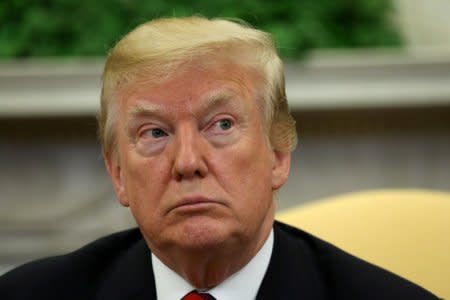U.S. 'maximum pressure' on North Korea faces test with summit in limbo

Thomson Reuters
By Phil Stewart and Matt Spetalnick
WASHINGTON (Reuters) - U.S. efforts to sustain and possibly intensify its "maximum pressure" campaign on North Korea are entering a perilous phase as a potential breakdown in diplomacy with Pyongyang raises fears that China may loosen its enforcement of international sanctions.
With the fate of a summit between President Donald Trump and North Korean leader Kim Jong Un in limbo, U.S. officials have suggested Washington may pursue fresh sanctions on Pyongyang over its nuclear program even though key players such as China and South Korea may be reluctant to participate.
Another way for the United States and its allies to increase pressure on North Korea could be to step up efforts to intercept ships suspected of violating international trade restrictions on Pyongyang. One U.S. official, speaking on condition of anonymity, said more countries are interested in joining that initiative.
Such moves would be designed to reinforce to Kim that he faces more potential economic pain, especially if he takes any provocative action after Trump on Thursday abruptly canceled their planned June 12 summit in Singapore.
Trump held out the possibility on Friday that the summit could still take place. His administration may be wary of acting precipitously on new sanctions while efforts are under way to salvage the meeting, aimed at forging a denuclearisation deal with North Korea that could defuse tensions dating to the 1950s on the Korean Peninsula.
Trump last year launched what his administration has called a "maximum pressure" campaign against North Korea combining the toughest-ever U.S. and international economic sanctions with diplomatic actions and the Republican president's military threats and preparations.
With the summit in doubt, a big challenge for the United States is that China, North Korea's main trading partner and the linchpin for sanctions enforcement, is increasingly at odds with Trump over how to deal with Pyongyang.
Even before scrubbing the summit, Trump urged China to maintain tight sanctions, writing on Twitter that "the word is that recently the Border has become much more porous."
Analysts have seen China's willingness to pressure North Korea as waning at a time when Beijing already is engaged in a trade dispute with Washington.
"China is already de-coupling," said Lee Seong-hyon, research fellow at South Korea's Sejong Institute think tank. "A high-level North Korean delegation just completed an 11-day economic tour of China's industrial cities."
'WATCHING CLOSELY'
A senior White House official, speaking on condition of anonymity, said China had given assurances it would keep up sanctions enforcement on North Korea. "We'll be watching closely to ensure that they do," the official added.
With no summit, the Trump administration would face the question of how much further it wants to go with its "maximum pressure" campaign. Pyongyang has been targeted in three U.S.-led United Nations sanctions resolutions since Trump took office last year.
"The goal here is to achieve maximum pressure," the White House official said. "We're still short of that."
While China would almost certainly block any U.S. attempt to win passage of more U.N. sanctions, the United States still has at its disposal further unilateral measures such as imposing its own new sanctions on North Korean officials and entities or additional Chinese companies that do business with Pyongyang.
Kim's two meetings in recent weeks with Chinese President Xi Jinping also have signaled warming ties that could make it harder for China to join with the United States in taking a harder line.
U.S. officials believe sanctions played a major role in leading North Korea to turn to diplomacy after years of missile and nuclear weapons tests. North Korea has said it did so because it had achieved its nuclear arms ambitions and wanted now to focus on economic development in the poor, isolated country.
While Trump's summit cancellation caused anxiety for U.S. ally South Korea, Seoul is expected to keep enforcing existing sanctions. But South Korea could be wary of joining any new U.S. measures that might damage its own delicate diplomatic engagement with the North.
"If China and South Korea go wobbly and the world goes wobbly on the maximum pressure campaign, you're putting Trump in a box, and that's the worst possible thing you could do right now," Republican U.S. Senator Lindsey Graham told Fox News.
The Trump administration has sought to convince allies that any weakening of sanctions pressure would harm diplomatic prospects for resolving the crisis and increase chances for military options to address North Korea's pursuit of a nuclear missile capable of striking the continental United States.
Seoul already was looking at ways to relax economic pressure on Pyongyang, although a senior South Korean official said, "We can't and won't do anything that may loosen sanctions on our own, breaking away from the international community."
(Additional reporting by Idrees Ali, Doina Chiacu and Lesley Wroughton in Washington, Michelle Nichols at the United Nations, Josh Smith and Hyonhee Shin in Seoul; Editing by Mary Milliken and Will Dunham)
See Also:

 Yahoo News
Yahoo News 
